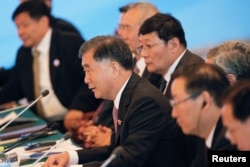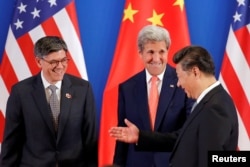U.S. Secretary of State John Kerry says the United States is urging China and its Asia-Pacific neighbors to "find a diplomatic solution" to the territorial disputes in the South China Sea.
Speaking at the opening of the eighth annual U.S.-China Strategic and Economic Dialogue in Beijing, Kerry stressed Washington's neutrality on the issue.
“We have taken no position on any of the claims of any claimant. The only position we’ve taken is - let’s not resolve this by unilateral action; let’s resolve this through rule of law, through diplomacy, through negotiation. And we urge all nations to find a diplomatic solution, rooted in international standards and rule of law,” Kerry said.
China has long accused the U.S. of taking sides and Chinese President Xi Jinping has called for more mutual trust.
"China and the U.S. need to increase communication and cooperation over Asia-Pacific affairs, the vast Pacific should be a stage for inclusive cooperation, not an arena for competition,” Xi said.
Kerry's comments referred to anxieties growing in the region over China's aggressive buildup of military installations on unoccupied islands and reefs in the South China Sea, many of which are also claimed by Taiwan, Vietnam, the Philippines, Brunei and Indonesia.
About $5 trillion of annual trade passes through the South China Sea, which is also believed to hold significant oil and gas reserves.
Air defense zone
Angry over U.S. surveillance flights over in the airspace over the region, Beijing is reportedly considering establishing an Air Defense Identification Zone over portions of the South China Sea, which would require all incoming aircraft to register with Chinese authorities to fly in the air route.
During a stopover in Mongolia Sunday, Kerry said such an action would be "a provocative and destabilizing act."
Kerry also used his opening remarks to highlight "new milestones in cooperation" between Beijing and Washington on a number of issues, including climate change, global health emergencies and curbing nuclear proliferation, including the recent tightening of sanctions against North Korea over its nuclear weapons program.
"It is imperative to keep the pressure on North Korea to halt any and all actions that threaten its neighbors and the threaten peace and security of the region," Kerry said.
Manage differences
In his opening remarks, Chinese President Xi Jinping said it was vital for the two nations to manage their differences in a "pragmatic and constructive fashion."
As Kerry and President Xi focused on foreign policy, U.S. Treasury Secretary Jacob Lew called on Beijing to cut its excess industrial capacity, especially steel and aluminum, saying it "has a distorting and damaging effect on global markets."
In his prepared remarks, Lew also praised the two countries "robust cooperation" in combating climate change.
Among the many diplomatic and economic issues the two sides will discuss during the two-day forum is cyber security.
Xi signed an agreement with U.S. President Barack Obama last year that neither government will conduct or knowingly support cyber-enabled espionage on behalf of their domestic-based companies.
A study conducted last year by the Ponemon Institute measured the effects of cyber crimes on more than 250 organizations, and found that the average annual cost of dealing with cyber crime is over $7 million.







